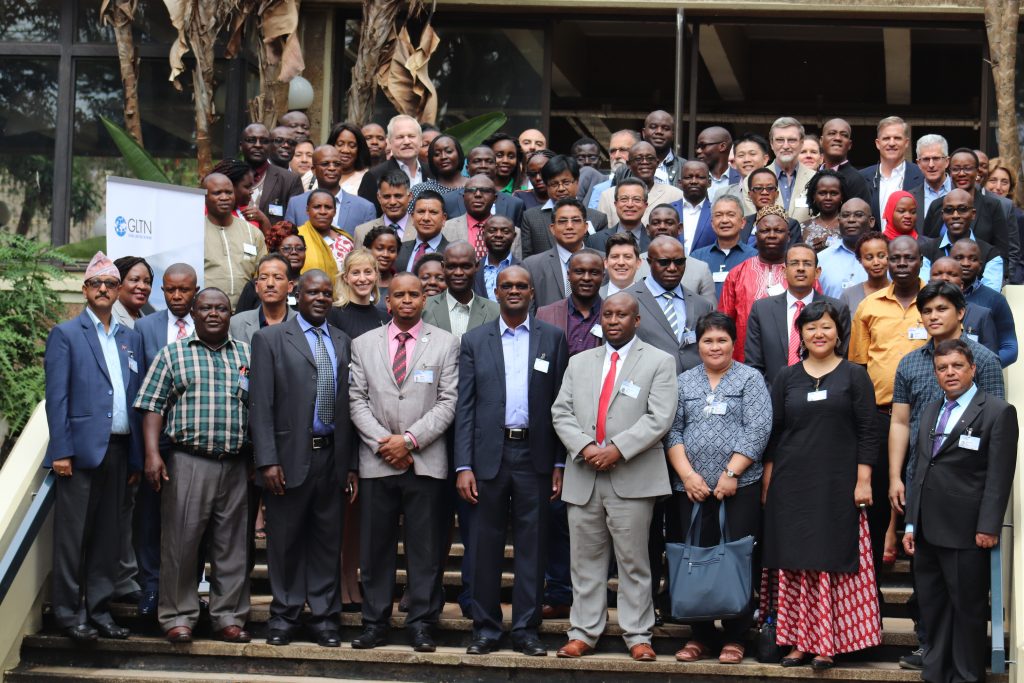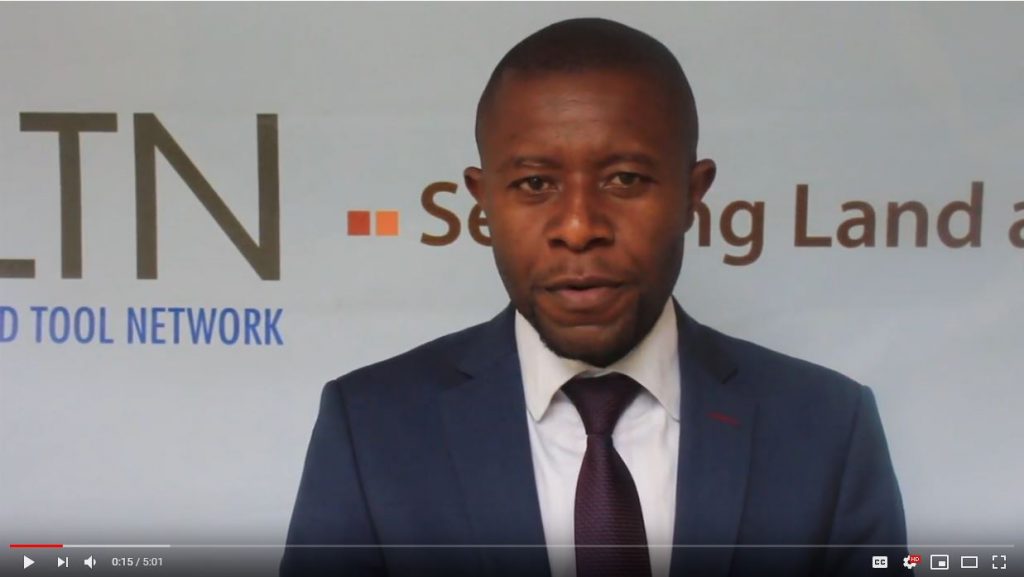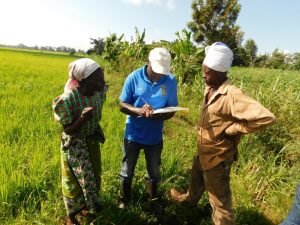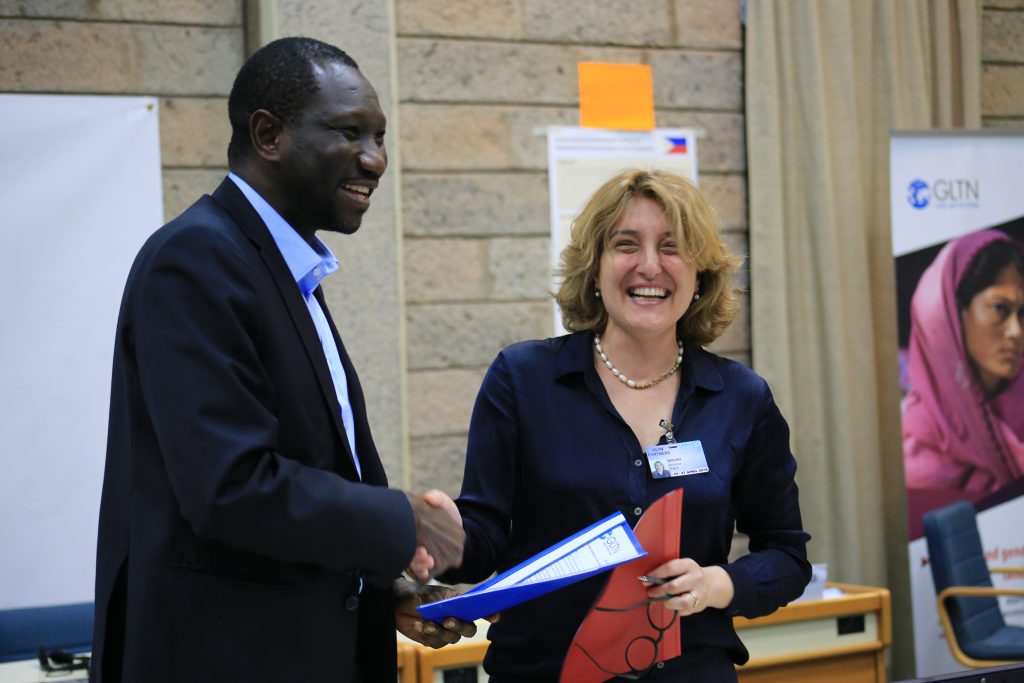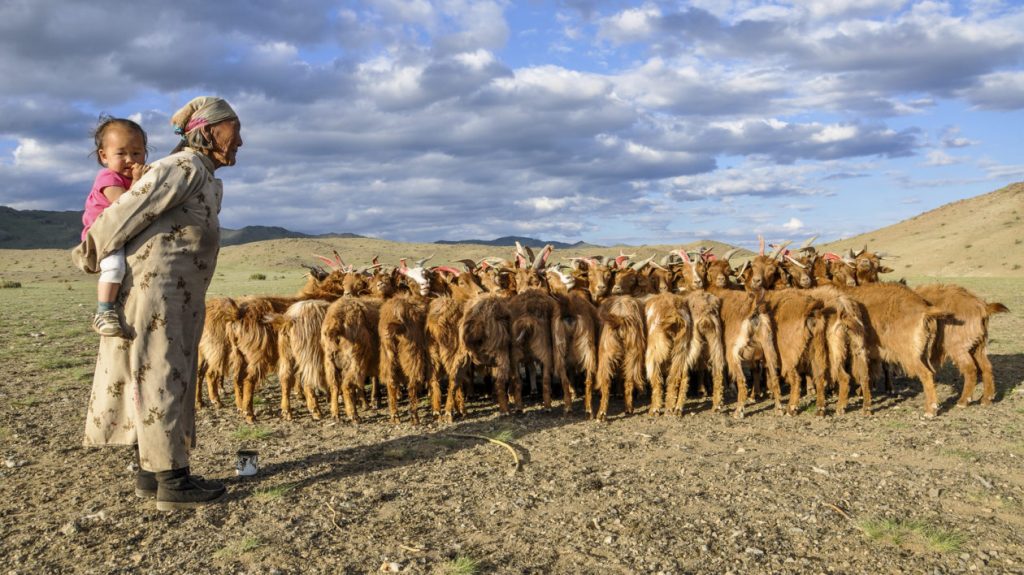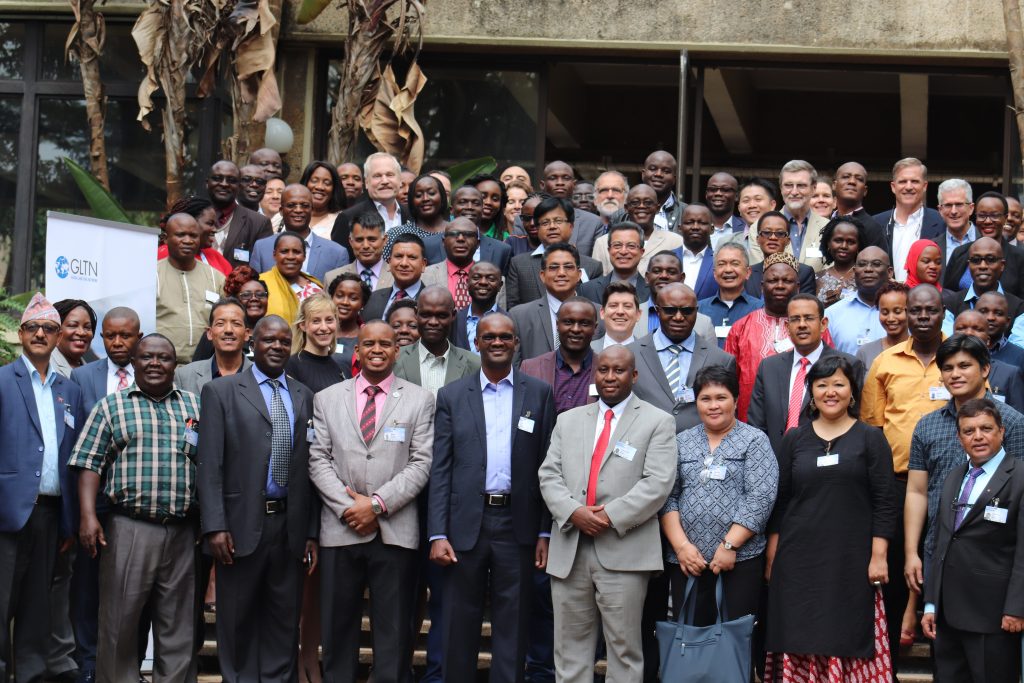1st to 4th December 2020
Theme: “Tenure Security as a key element of COVID-19 response and impact mitigation”
REGISTRATION FOR THE MEETING
GLTN Partners and Members are invited to register their interest in participating in the meeting simply by sending an email to: unhabitat-gltn@un.org c.c.: markicevic.isidora@un.org, victor.wainaina@un.org. Your contacts will be registered you will be contacted with further information relevant to the virtual meeting.
GLTN is a dynamic alliance of more than 80 global land actors and stakeholders. It was launched in 2006 in response to critical gaps in land governance and administration approaches, tools and systems, which meant they could not deliver land tenure security at scale. Our partners work together to improve tenure security for as many people as possible by developing and disseminating:
- An inclusive land tenure approach: one that recognizes various forms of tenure, and that involves stakeholders in seeking solutions that are fair and just to all, and
- A set of practical, innovative land tools: practical, innovative methods to solve problems related to land tenure.
The 8th GLTN Partners’ Meeting 2020 will focus on strategic decisions and policy directions of the Network, discussions on the implementation of the GLTN programme in the context of COVID-19 pandemic and strengthening partnership and collaboration within the Network.
We develop, test and demonstrate these tools in a range of countries, aiming to catalyse their wide use and adoption. Our Network includes representation of all relevant professions and disciplines, civil society and grassroots organizations, multilateral and bilateral organizations. Because we are a network of organizations, many of which are themselves networks, we add considerably to our global footprint, country reach and on-the-ground impact. We also enjoy partnerships and technical support arrangements with a growing number of national governments and local municipalities.
Since 2006 our Network has grown in strength in terms of its diversity of partners, its development of land tools, and its expertise and capacity. Our approach and agenda have been endorsed internationally by United Nations member states, global frameworks and other key land institutions and actors. We have received generous support from several donors.
GLTN Phase 3 Strategy (2018-2030) was jointly developed by Partners through an intensive strategic review. In this phase, the Partners share a strong vision for a world in which everyone enjoys secure land rights. The inclusive mission is that partners work together to develop and implement inclusive, fit-for-purpose and gender-responsive land tools to improve living conditions for all, prioritizing women, youth and vulnerable groups in both urban and rural settings. The goal for 2030 is improved tenure security for all, with a focus on women, youth and vulnerable groups.
The governance and management arrangements in GLTN’s Phase 3 respond to aspirations of the Phase 3 strategy, the practical requirements for the implementation of the programme, as well as changes in the land sector, formal feedback from the Phase 2 programme evaluations and consultations with the partners. Based on these elements, the key features of governance in the Phase 3 are:
- More compact, partner-inclusive and streamlined governance framework with three components (compared to five in Phase 2) with the main change being the merging of the International Advisory Board and the Steering Committee that embodies a broader representation of the GLTN partners (represented via the clusters).
- Clearer strategic advisory role for partners and opportunities for policy and thematic inputs.
This is achieved through following elements:
– A new Steering Committee which comprises mostly of partners;
– A new role for the partners’ meeting as a mechanism for partners to endorse key strategic and programmatic documents;
– Greater clarity around the role of all bodies in the governance framework through the GLTN Charter which outlines the roles and functions of each of the governing bodies;
– Encouragement of commitment and engagement with the GLTN Phase 3 agenda and to facilitate the vibrancy and reciprocity of the GLTN partnership through the request for partners and individual members to sign onto the GLTN Charter;
– Greater clarity on the role of the Secretariat and clear lines of accountability to the partners;
– Adoption of nominated dual cluster leadership across all clusters to promote innovation and transparency and to share the workload.
See: Current members of the GLTN Steering Committee
The year 2020 has by no means been business as usual. The impact of COVID-19 has been felt across the globe in a wide range of countries and very different environments. The pandemic has already affected countries in every region, making this a truly global situation where every country must take steps to prepare and respond.
Secure tenure and housing have become the front-line defence against the Covid-19.
The pandemic has hit the most vulnerable people the hardest. The economic consequences for those in informal settlements will be long-lasting. With many countries suspending daily activities and restricting movement, day labourers and those in informal employment have lost their income. This has resulted in people being forced to leave their homes due to their inability to pay the rent. Without any social benefits, they are unable to care for their families.
Secure tenure and housing have become the front-line defence against the Covid-19. According to UN Special Rapporteur on the right to adequate housing, home has rarely been more of a life or death situation. As governments worldwide are relying on people to stay home to prevent the spread of the virus, having secure tenure is crucial to be able to implement this. Governments must take measures to prevent forced evictions and to provide solutions for the homeless
.
Early on, some countries introduced measures such as moratoriums on evictions due to rental and mortgage arrears; deferrals of mortgage payments for those affected by the virus; extension of winter moratoriums on forced evictions of informal settlements; and increased access to sanitation and emergency shelter spaces for homeless people
. These are now progressively being lifted and eviction threats are becoming increasingly real.The Special Rapporteur called upon governments to “cease all evictions; provide emergency housing with services for those who are affected by the virus and must isolate; ensure that the enforcement of containment measures (e.g. curfews) does not lead to the punishment of anyone based on their housing status; provide equal access to testing and health care; and provide adequate housing which may require the implementation of extraordinary measures as appropriate in a state of emergency, including using vacant and abandoned units and available short-term rentals.” She also warned of a “risk that such measures will enable global financial actors to use the pandemic and the misfortunes of many to dominate housing markets without regard for human rights standards” and she urged states to “prevent the predatory practices of institutional investors in the area of residential real estate.”
The 2020 GLTN Partners’ Meeting happens at a vulnerable and critical time in the recent human history. The global pandemic has posed tremendous challenges on governments, even more so in developing countries. Now, more than ever, collaboration and partnerships among many different sectors and actors are necessary.The work of Global Land Tool Network partners on housing rights, security of tenure and combatting forced evictions can help governments to develop effective policy measures and collaborative solutions in this respect.
The main theme of the meeting is “Tenure Security as a key element of COVID-19 response and impact mitigation”.
The focus of the meeting will be on strategic decisions and policy directions of the Network, discussions on the implementation of the GLTN programme in the context of COVID-19 pandemic and strengthening partnership and collaboration within the Network.
Specific objectives for the 8th GLTN Partners’ Meeting are:
1. To provide an opportunity to share and discuss experiences, trends and tools related to land tenure security;
2. To reflect on the implementation of the GLTN Phase 3 strategy, cluster priorities and work plan in the context of COVID-19;
3. To fulfil the requirements of the Partners’ Charter regarding the election of cluster leads and the GLTN Steering Committee.

Download:
GLTN Partners Meeting Programme as of 27 November 2020
<strong>Tuesday, 1 December 2020</strong>
TIME: 10am – 12pm EAT
TITLE OF EVENT: Rural communities in defense of COVID-19 pandemic
ORGANISING PARTNERS: Asian NGO Coalition for Agrarian Reform and Rural Development and GLTN Rural CSOs Cluster
ABSTRACT:
As scientists and medical experts try to decipher and find the cure to the corona virus, economists, technocrats and political leaders have responded and have started to prepare for the “new normal”. The pandemic is a result of the prominent “development” model geared towards the unrelenting quest to control and to commodify nature.
The rural sector was one of those hit hard by the COVID-19 crisis, with farmers, indigenous peoples, fisherfolk and other rural stakeholders struggling to sustain their livelihoods and facing threats of food and tenure insecurity. CSOs and partner communities have been actively calling on their countries’ governments to address the crisis through mass testing, support for the public health sector, and aid for poor and vulnerable populations. Yet despite the challenges of today’s times, there has been no shortage of civil society action.
The side event aims to provide a venue to share the perspectives of rural CSOs and communities with regard to the causes and impact of the pandemic. It shall also present some of the initiatives undertaken by rural CSOs and communities to mitigate and/or cope with the pandemic. Finally, the plenary discussion will revolve on key areas for action that the GLTN network can undertake together towards protecting land rights and ensuring food security.
TIME: 12.30pm – 2.30pm EAT
TITLE OF EVENT: Securing land rights for women and girls: what COVID-19 has taught us
ORGANISING PARTNERS: Oxfam and International Land Coalition
ABSTRACT:
As The outbreak of Coronavirus Virus pandemic has severely exposed the levels of existing inequality around the globe, but also the consequences of the inaction by development partners and state government to guarantee the very basic fundamental human rights to all in the society. Access to decent jobs, comprehensive healthcare and housing among set those living in poverty and margins of development is perhaps the first sight that tells the story of inequality. Underlying these inequities, is undoubtedly the importance of protecting land rights and control over natural resources, particularly for women, girls and of the most vulnerable. Impacts of poor and lack of access to health and negative impacts resulting from the economic crisis due to this pandemic are more severe for women farmers and indigenous and small farmer communities who produce much of the world’s food. People with precarious secure land tenure rely on public services and community redress mechanism to use land for shelter and as a productive asset. Due to restricted movements and cessations, most public institutions, and community organised groups had to closed. The supply and economic value chains for small and medium income earners including small scale farmers were disrupted. The COVID-19 pandemic has thus “added fuel to the fire” of an already growing crisis as insecure land tenure is exacerbated by conflicts and climate crises which affect the ability of women to participate in livelihood activities and to grow food.
The COVID19 pandemic has disproportionately affected the most marginalized and has increased inequality between and within different groups in society. As a result there is greater food insecurity, more evictions, loss of jobs especially for young people, and authoritarian measure to address the economic crisis through more investment in large-scale projects, all of which could put further pressure on land used by women and undermine their tenure security.
This side event will shed light on what COVID19 has taught us on the importance of securing land rights for women across all tenure systems and how international processes are crucial to ensuring that we are building back better including securing most fundamental rights like control over land and natural resources by women and girls . The Five Years Transformative Action Plans (2021-2026) that intends to fast track gender equality, women’s empowerment and their human rights as envisioned by the review of Beijing Platform for Actions must Secure Land Tenure Rights for Women and Girls First and Now!
The event, co-organized by Oxfam and International Land Coalition (ILC), will involve speakers from Africa, Asia and Latin America who have been actively working to influence women’s land rights frameworks at the national, regional and international levels and in addition , who have firsthand information on how COVID19 has affected women´s land rights at local levels.
This side event links strongly with the GLTN phase 3 strategy which has a strong vision for a world in which everyone enjoys secure land rights. Through working together as partners to develop and implement inclusive, fit-for-purpose and gender-responsive land tools to improve living conditions for all, prioritizing women, youth and vulnerable groups in both urban and rural settings. COVID19 has taught us to work together across different sectors. Being a public health issue, it has effects on all sectors, including land rights and economic justice more broadly.
TIME: 3pm – 5pm EAT
TITLE OF EVENT: Book launch – ‘Land Issues in Urban Governance in Sub-Saharan Africa’
ORGANISING PARTNERS: University of East London
ABSTRACT:
Background. The book, to be launched by its editor, Professor Robert Home, is one in a series by Springer Nature on Local and Urban Governance (series editor Professor Carlos Nunes Silva, University of Lisbon). By 2030 Africa’s urban population will exceed half of its total population, and will require infrastructure, social services, affordable housing and employment opportunities, which all depend upon land.
Key topic. Land governance systems continue to be influenced by the continent’s colonial past, and conflicts over land and natural resources require appropriate rules, processes and structures for resolution. Five of the 17 Sustainable Development Goals specifically refer to the role of land, and the New Urban Agenda identifies it as a key driver for inclusive and sustainable human settlements and urban development. Land governance is, therefore, a critical focus for developmental agendas and related interventions.
Objectives of the event. To develop knowledge to the GLTN international research and teaching organizations (book contributors include Siraj Sait and Uchendu Chigbu, GLTN Partners) and international professional organizations. NELGA (Network of Excellence in Land Governance in Africa) potentially has an important part to play.
Linkages with GLTN Phase 3 Strategy 2018-30. This includes addressing the continuum of land rights (Sub-Saharan Africa has a plurality of tenure types, often vying for legal recognition and social legitimacy), and developing fit-for-purpose land administration, recognising the legitimate land rights of the poor, women and marginalized groups.
<strong>Wednesday, 2 December 2020</strong>
TIME: 10am – 12pm EAT
TITLE OF EVENT: Roundtable – Urban land markets in East African cities and rental tenure security
ORGANISING PARTNERS: Institute for Housing and Urban Development Studies, Erasmus University; The Bartlett Development Planning Unit, University College London and IPE Tripleline, London
ABSTRACT:
Our research indicated that land markets are creating/facilitating significant housing rental markets where the quality of the housing is invariably lower and higher density, even if the tenancies were relatively secure. The research also suggested that incentives for improving living conditions in developments for rental tenancy were lacking because the returns on investments for landlords were comparable with returns for higher income housing. In the discussion our objective is to identify the ways in which rental tenure security is related to urban land market dynamics.
The Organising Partners will provide a short input to provoke discussion and then facilitate discussion with participants to share insights.
<strong>Thursday, 3 December 2020</strong>
No side event planned.
<strong>Friday, 4 December 2020</strong>
TIME: 10am – 12pm EAT
TITLE OF EVENT: Pivoting: innovative and effective communications strategies in the time of Covid-19
ORGANISING PARTNERS: Land Portal Foundation
ABSTRACT:
Background of the event: Covid-19 has no doubt changed the way we interact with one another and the way we are able to effectively communicate in our day to day lives. When it comes to leveraging visibility for land rights globally, and keeping land on the agenda and minds of a variety of stakeholders, Covid-19 has forced us to pivot as well as innovate in our methods of communication. Traditional communications methods such as in person conferences or launches, have been put on hold for the foreseeable future. This means that our strictly digital efforts to advocate and campaign for improved tenure security for all, need to be sharp and poignant; they need to somehow cut through and complement the Covid-19 related news we are consistently seeking. Now more than ever, however, our communications efforts must not only be captivating, they also have to be inclusive. It is our responsibility to find the best ways to communicate outwardly, but to keep everyone involved in the process, including women, youth and vulnerable groups.
Key topic: communications, land rights, Covid-19, open data
Objectives of the event:
- For participants and organizers to share on the communications methods they have traditionally used;
- For participants to share how their communications methods have changed since the onset of Covid-19;
- For participants to share how this has not only created challenges, but opportunities for the way forward;
- For participants to learn about and engage in discussion on the important role of open data in leveraging the land rights agenda;
- For participants and organizers to discuss how, as a land community, we can better work together to effectively and communicate on the importance of land rights. (How can we better preach to those who are not yet converted).
Linkages with the GLTN Phase 3 Strategy: An important aspect of Phase 3 of this strategy is improved tenure security for all, with a focus on women, youth and vulnerable groups. The session will therefore focus strongly on two important communications methods adopted by the Land Portal: “passing the microphone” and “inclusive communications”. This will be demonstrated and discussed via specific communications initiatives we have undertaken, with time for participant responses and sharing of their own experiences and suggestions. We will also discuss how our open data work contributes to increased visibility for the land rights agenda and how this is particularly useful in the current global context. The side event promises to be interactive and focus on discussion rather than presentation.
TIME: 12.30pm – 2.30pm EAT
TITLE OF EVENT: Collecting best practices Fit-For-Purpose Land Administration & STDM
ORGANISING PARTNERS: Kadaster International, FIG, Cadasta Foundation, ITC/University of Twente/Volunteer Community Surveyor Programme
ABSTRACT:
Since the launch of the concepts STDM (2010) and Fit For Purpose Land Administration (2014) partners of GLTN have contributed to the implementation of these concepts in different places, different contexts and at different levels all over the world.
During this side event we will focus on how, as partners, we can collect experiences and lessons learned from projects in the world where principles of the FFP approach and STDM were applied.
The content from the session will be used for a publication on Fit For Purpose Land Administration implementation. This publication will be prepared by FIG and GLTN and supported by Kadaster and ITC.
The session and the planned publication will contribute to phase 3 by actively sharing experiences and results to inspire and encourage further use of the land tools Fit For Purpose Land Administration and STDM.
Download:
GLTN Partners Meeting Programme as of 27 November 2020
#lvca-tabs-6658c9411e354.lvca-style6 .lvca-tab-nav .lvca-tab.lvca-active a { border-color: #008df9; }
PREVIOUS GLTN PARTNERS' MEETINGS
Downloads
Related
GLTN Partners convene for the 8th Partners Meeting 1-4 December 2020
Transcript: Carly Nanzu Kasivita Provincial Minster in Charge of Land Affairs Urbanisation and Housing in North Kivu in the DR Congo
Taking Stock of GLTN’s Engagement in the Land Sector
GLTN and ILC solidify collaboration
UN Habitat Executive Director’s Message to the 7th GLTN Partners Meeting 2018
Why measuring land tenure matters: from the SDGs to impact evaluation
7th GLTN Partners Meeting 2018 wraps up in Nairobi
Good land governance is essential for improved livelihoods – CS Karoney
GLTN Partners convene for the 7th Partners Meeting
